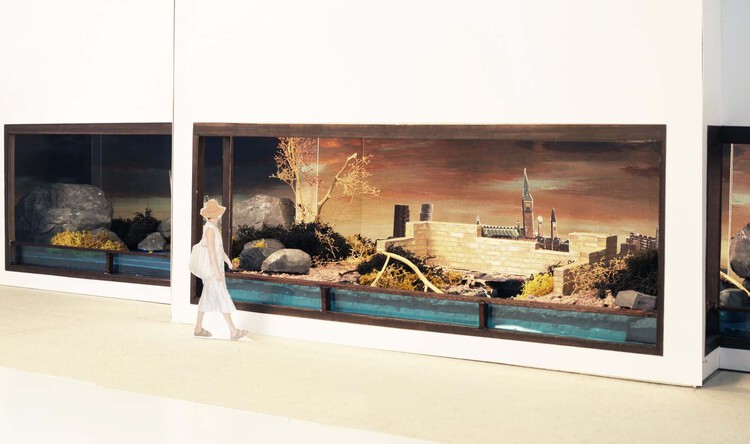"So We Can Be Here in 100 Years": In Conversation with Josephine Michau, Curator of Danish Pavilion at the 2023 Venice Biennale
This year’s Danish Pavilion at The 18th International Architecture Exhibition – La Biennale di Venezia, was curated by Josephine Michau. Titled “Coastal Imaginaries,” the exhibition addresses solutions to alleviate global challenges such as rising sea levels and storm floods. Onsite in Venice, ArchDaily had the chance to speak with the curator Josephine Michau, where she discussed the thought process behind the pavilion, the collaborations, and her hopes of starting meaningful dialogue as a result of the exhibition.
“Coastal Imaginaries” finds a common link between Denmark and Venice, addressing a shared struggle. In fact, both cities “share the enchantment and the threat of the ocean.” With sea levels rising and storm floods growing faster than ever before in human history, the pavilion represents the world's climactic state. “Coastal Imaginaries” directly asks architects, designers, and viewers to rethink their relationship to the climate crisis, urging architects to find new ways to respond to these threats.

The pavilion explores “nature-based solutions” for coastal protection and climate adaptation. Through many collaborations and presentations of key researchers in the field, the pavilion provides a holistic understanding of both short and long-term solutions to the crisis. For example, the display invites “Mitigating Sea Level Rise,” a group focused on finding ways to work with nature around rising sea levels. They were able to identify 7 core principles and ways of working with the natural processes of water flow, instead of against them. In fact, the pavilion urges the Copenhagen authorities to implement the solutions, ensuring that water can be both absorbed and rereleased according to the mitigation strategy. Overall, the proposals focus on Copenhagen, a city celebrated as the UNESCO 2023 World Capital of Architecture, yet under the constant threat posed by rising sea levels.
Related Article
Indonesia Plans to Build Its New Capital from the Ground Up to Replace the Sinking City of JakartaInvolved in many initiatives in Copenhagen, Josephine Michau is also the founder and director of the Copenhagen Architecture Festival, an annual event since 2014 that aims to broaden the concept of architecture and its pervasive influence on every aspect of human existence. This year, their global short film competition focused on the goals of the UN's agenda, in time for the UIA 2023 Congress of Architects in Copenhagen.


Through the interview and the exhibition, curator Josephine Michau aims to show the public and industry professionals a catalog of nature-based solutions that respond to today's storm surges and flooding challenges. Many coastal cities are in formidable positions that “demand a massive restructure of architecture and what architecture should do.” Another example of collaboration with solution-based researchers is the showcase of the “Architecture for Extreme Environments” solution-based portfolio. The exhibition invites researchers to show their findings on extreme weather environments. The research is expansive and aims to provide solutions and prototypes for cities that are in urgent situations. For example, Jakarta is a megacity that is under sea levels as of right now. A big operation to move the entire city to a new island is being planned for the next few years. Michau goes on to state that “a third of Pakistan is under water, Bangladesh is also experiencing it, as well as Indonesia.”

Overall, the curation encourages both short and long-term solutions to be considered. Some urgent situations call for prototypes that can deal immediately with frequent flooding. However, the exhibition is also engaged with landscape urbanists providing more long-term solutions. Overall, the aim of the display is to create a dialogue around new ways and processes to deal with the looming climate crisis “so we can be here in 100 years.”
Many other exhibitions have been interested in the same pressing issues in the 18th International Architecture Exhibition. Under Lesley Lokko’s overarching theme, The Laboratory of the Future, many pavilions are exploring what threats we are facing today that will shape the way in which we live in the future. Argentina’s Pavilion, “The Future of Water,” highlights the country’s intimate relationship with water, reflecting on future actions. Urban Radicals presented “A Brick for Venice,” a temporary pavilion made entirely of mud from the city’s canals. Finally, the Pavilion of Slovenia explores the theme of ecology and its relation to the built environment. Moreover, the exhibition explores energy efficiency and its application to vernacular European buildings.
We invite you to check out ArchDaily's comprehensive coverage of the Venice Architecture Biennale 2023.
https://ift.tt/6YgnfIw
Entertainment





No comments:
Post a Comment